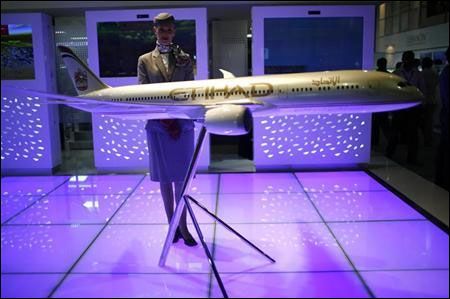 | « Back to article | Print this article |
 Defending its decision to raise the number of seats under the India-United Arab Emirates (UAE) air services pact, the Civil Aviation Ministry, in a note to the Cabinet Secretariat and key ministries, has said no additional points of call have been allowed to the Gulf country.
Defending its decision to raise the number of seats under the India-United Arab Emirates (UAE) air services pact, the Civil Aviation Ministry, in a note to the Cabinet Secretariat and key ministries, has said no additional points of call have been allowed to the Gulf country.
At present, the UAE’s carriers have 11 points of call in India. The UAE had asked for rights to fly to 38 cities in India during the recent negotiations.
The ministry has also clarified that the bilateral air services agreement between India and the UAE was signed on March 21, 1989, and a new memorandum of understanding (MoU) was initiated way back on February 5, 2008. So, no new air services agreement has been signed between the two countries recently.
The ministry signed an MoU with the UAE on April 24 to enhance the number of seats between the two countries from 13,300 a week to 50,000, on the same day Abu Dhabi-based Etihad Airways announced it would pick up a 24 per cent stake in Jet Airways (India) Ltd.
The India-UAE MoU, as well as the Jet-Etihad deal, has already sparked off a controversy in political circles in India. Critics cited security concerns and the shift of operational control in Indian carriers to foreign airlines as reasons for reconsidering the decision to allot higher traffic rights to the UAE.
Several political leaders, including the Bharatiya Janata Party’s Jaswant Singh, had alleged that the decision to increase the number of seats would indirectly benefit Jet Airways, and had asked the government to investigate the stake sale deal.
Allaying fears expressed by Singh and Janata Party president Subramanian Swamy that the enhancement of seats is fraught with national security risks, the aviation ministry said no amendment had been made in the security clause in the new MoU.
The Prime Minister’s Office (PMO) has now asked the civil aviation ministry to prepare a Cabinet note for post-facto approval of the agreement.
In its note, which has been sent to the secretaries in the ministry of home affairs, economic affairs, commerce and industry, corporate affairs, defence and the PMO, the aviation ministry has argued that there are enough safeguards incorporated in the policy against any security threat from foreign airlines.
For instance, under the air defence clearance mechanism, a foreign airline entering Indian air space has to comply with air defence clearance rules. Foreign airlines cannot fly over civil and military air space in India or enter the air defence identification zones without clearances.
Besides, there are checks and balances in place in the existing foreign direct investment (FDI) policy, which restricts foreign carriers buying equity in Indian domestic carriers from shifting the principal place of business out of India.
All foreign nationals likely to be associated with Indian carriers have to get security clearance. All technical equipment being imported require clearance from the relevant authority. Also, every chairman and director requires security clearance before employment.
If the positions of the chief executive, chief financial officer and chief operating officer are held by foreign nationals, it would have to be vetted by the ministry of home affairs.
The note also states since FDI by foreign carriers in Indian airlines is capped at 49 per cent, the substantial ownership and the effective control would remain with Indian nationals. The liability of the airline in instance of national emergency would not alter even after FDI infusion.